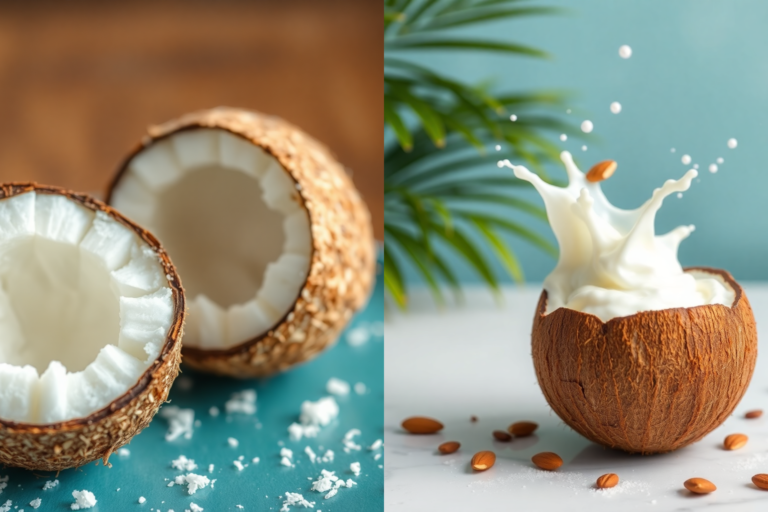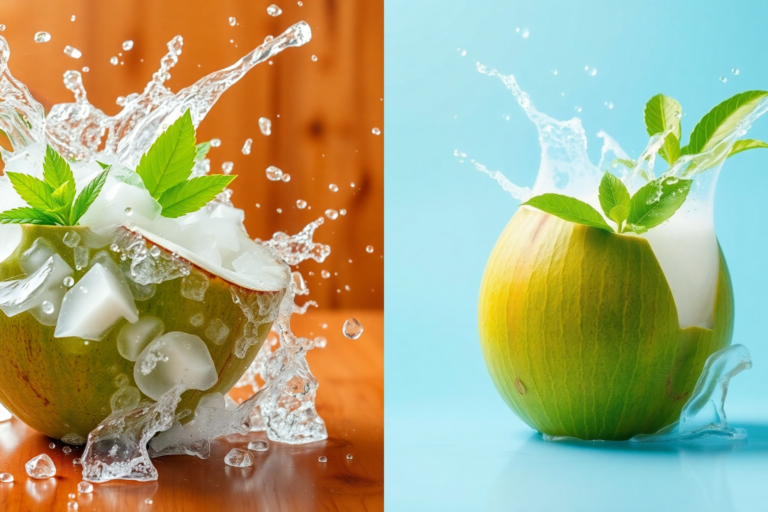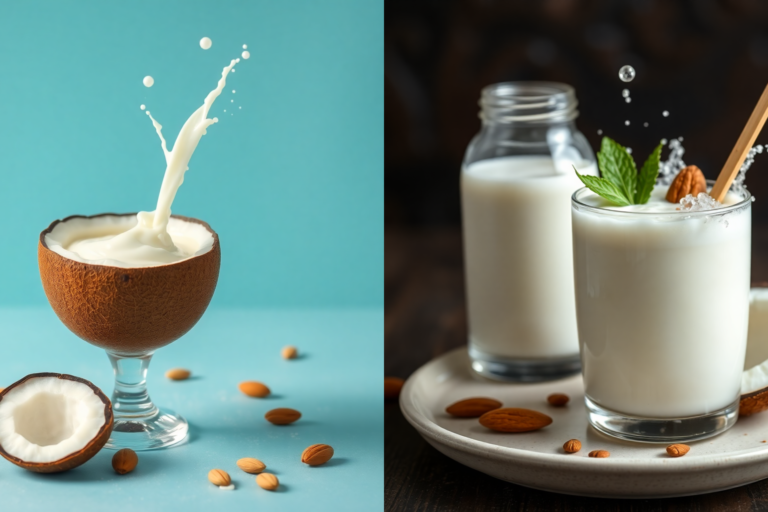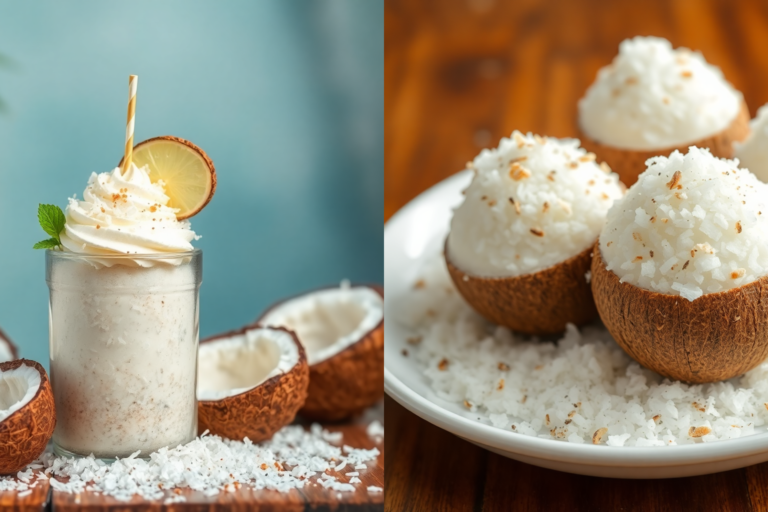Introduction of Coconut Water Nutrition Facts
Coconut water, often referred to as nature’s sports drink, has surged in popularity over the past few years, becoming a staple in health-conscious diets worldwide. This clear, nutrient-rich liquid found inside young green coconuts is celebrated not only for its refreshing taste but also for its impressive array of health benefits. With its naturally sweet flavor and hydrating properties, coconut water has gained traction among athletes, fitness enthusiasts, and those seeking healthier beverage alternatives.
The rise of coconut water can be attributed to its rich content of electrolytes, particularly potassium, which plays a crucial role in hydration and muscle function. Additionally, it contains various vitamins and minerals, making it an appealing option for those looking to replenish lost fluids after physical activity. As consumers become more aware of the importance of hydration and the nutritional value of their food and drink choices, coconut water has emerged as a go-to option.
However, despite its widespread acclaim, there are many myths surrounding coconut water that can obscure its true nutritional value. This article aims to debunk these common misconceptions and present the nutritional realities associated with coconut water. By examining “Coconut Water Nutrition Facts,” we will explore its benefits, potential drawbacks, and how it compares to other hydration options. Whether you are a seasoned coconut water fan or just starting to incorporate it into your diet, understanding the truths behind “Coconut Water Nutrition Facts” will help you make informed decisions about your hydration and health.
Myth 1: Coconut Water is Just Like Sports Drinks
Reality: Comparing Electrolyte Content and Natural Sugars in Coconut Water Versus Commercial Sports Drinks
Coconut water has gained popularity as a natural hydrator, often marketed as a healthier alternative to commercial sports drinks. However, it’s essential to understand the differences between these two beverages, particularly regarding their electrolyte content and natural sugars. In this discussion, we will explore Coconut Water Nutrition Facts to shed light on why coconut water stands out as a superior choice for hydration.
Electrolyte Content in Coconut Water vs. Sports Drinks
When comparing Coconut Water Nutrition Facts to those of commercial sports drinks, one of the most notable differences is the electrolyte content. Coconut water is rich in essential electrolytes such as potassium, sodium, calcium, and magnesium, which are vital for maintaining fluid balance, nerve function, and muscle contractions. A typical serving of coconut water contains approximately:
- Potassium: About 600 mg, which is more than most sports drinks.
- Sodium: Ranges from 30 to 60 mg, making it a low-sodium option.
- Magnesium: Around 60 mg, contributing to overall muscle health.
- Calcium: Approximately 45 mg, supporting bone health.
In contrast, many commercial sports drinks often contain higher levels of sodium and sugar, designed to replenish electrolytes lost during intense workouts. While they do provide electrolytes, they can also introduce excessive sugars and artificial ingredients that may not align with health goals. This is where Coconut Water Nutrition Facts highlight the advantages of coconut water as a more natural alternative.
Natural Sugars in Coconut Water
Another significant difference lies in the sugar content. Coconut water contains natural sugars, approximately 6 grams per cup, which provide a quick source of energy without the spikes in blood sugar associated with added sugars in many sports drinks. This natural sweetness comes from the ripe coconuts, and unlike the high fructose corn syrup or artificial sweeteners found in commercial sports drinks, coconut water’s sugars are accompanied by various nutrients that promote overall health.
Nutritional Benefits of Coconut Water as a Natural Hydrator
The nutritional profile of coconut water positions it as an excellent natural hydrator. When considering Coconut Water Nutrition Facts, it’s clear that this beverage offers several advantages:
- Natural Hydration: With its high potassium content, coconut water aids in rehydration, making it an ideal choice after exercise or on hot days.
- Low-Calorie Option: Coconut water typically has fewer calories than most sports drinks, making it suitable for those looking to manage their caloric intake.
- Rich in Antioxidants: Coconut water contains antioxidants that can help neutralize oxidative stress, further enhancing its hydrating benefits.
In summary, while coconut water and commercial sports drinks may both serve the purpose of hydration, their nutritional profiles differ significantly. Coconut Water Nutrition Facts illustrate that coconut water is a natural, wholesome alternative, providing essential electrolytes without the drawbacks of artificial ingredients and excessive sugars. By choosing coconut water, individuals can enjoy the benefits of a refreshing, nutritious beverage that supports their hydration needs naturally.
Myth 2: Coconut Water Can Replace All Forms of Hydration
Reality: The Importance of Varied Hydration Sources
Coconut water has gained immense popularity in recent years as a natural beverage packed with nutrients and electrolytes. However, the belief that coconut water can replace all forms of hydration is a common myth that deserves a closer look. While coconut water offers several benefits, it is essential to understand the importance of a varied hydration strategy that includes plain water and other beverages.
Understanding Coconut Water Nutrition Facts
Coconut water nutrition facts reveal that this refreshing drink is low in calories and contains essential electrolytes like potassium, sodium, and magnesium, making it an excellent choice for hydration. However, it is crucial to recognize that coconut water is not a one-size-fits-all solution for hydration. It should complement, not replace, other hydration sources.
When is Coconut Water Beneficial?
Coconut water can be particularly beneficial in specific situations:
Post-Exercise Recovery: After intense physical activity, coconut water serves as a natural electrolyte-rich drink, helping to replenish lost minerals. The coconut water nutrition facts highlight its high potassium content, which can aid in muscle function and prevent cramping.
Hot Weather: On sweltering days, coconut water can provide a refreshing and hydrating option. It can help combat dehydration caused by excessive sweating, making it a tasty choice when you’re outdoors.
Mild Dehydration: For those experiencing mild dehydration, such as after a long flight or during illness, coconut water can offer a palatable alternative to plain water, helping to restore electrolyte balance.
When is Plain Water Essential?
Despite the benefits of coconut water, there are times when plain water remains the best choice for hydration:
Daily Hydration Needs: The primary source of hydration for most people should still be plain water. While coconut water nutrition facts show that it contains electrolytes, it also has natural sugars that, when consumed excessively, could lead to unwanted calorie intake. Drinking plain water ensures that your hydration needs are met without additional calories.
High-Intensity Workouts: During prolonged or high-intensity workouts, plain water is essential for maintaining hydration levels. Coconut water can complement your hydration strategy, but it shouldn’t be your sole source. It’s important to drink enough water before, during, and after exercise to maintain optimal performance.
Medical Conditions: Individuals with certain medical conditions, such as diabetes, should be cautious with their coconut water intake due to its natural sugar content. In such cases, consulting a healthcare professional about hydration strategies is advisable.
Myth 3: Coconut Water is a Miracle Health Cure
Reality Check on Coconut Water’s Health Claims
Coconut water has gained immense popularity in recent years, often touted as a miracle health cure. From claims of rapid weight loss to detoxification benefits, many people believe that simply drinking coconut water can solve their health problems. However, it’s essential to critically examine these claims and understand what the science says.
Nutritional Overview: Coconut Water Nutrition Facts
Before diving into the specific health claims, let’s explore the nutritional profile of coconut water. Per 100 ml, coconut water typically contains:
- Calories: Approximately 19
- Carbohydrates: 3.7 g
- Sugars: 2.6 g
- Fiber: 1.1 g
- Fat: 0.2 g
- Protein: 0.7 g
- Vitamins and Minerals: Rich in potassium (around 250 mg), magnesium, calcium, and sodium.
These Coconut Water Nutrition Facts demonstrate that coconut water is low in calories and offers a good source of hydration, making it a refreshing beverage. However, when it comes to the broader claims of miraculous health benefits, the evidence is less clear.
Health Claim 1: Coconut Water Aids in Weight Loss
Many proponents assert that coconut water can aid in weight loss due to its low-calorie content and ability to promote hydration. While hydration is critical for weight management, the notion that coconut water alone can lead to significant weight loss is misleading.
Scientific Backing: Research suggests that hydration can aid in weight loss by increasing metabolism and reducing appetite. However, coconut water does not have any unique properties that make it superior to other low-calorie beverages, such as plain water or herbal teas. Thus, while it can be a part of a balanced diet, it should not be relied upon as a miracle cure for weight loss.
Health Claim 2: Coconut Water is a Detoxifying Agent
Detoxification has become a buzzword, and coconut water is often marketed as a natural detoxifier that cleanses the body of toxins. Some believe that drinking coconut water can flush out impurities and improve overall health.
Scientific Backing: While hydration supports the body’s natural detoxification processes, there is no scientific evidence directly linking coconut water to enhanced detoxification. The liver and kidneys are primarily responsible for detoxifying the body, and they do not require specific foods or beverages to function effectively. Drinking coconut water can contribute to hydration, which is beneficial, but it does not possess unique detoxifying properties.
Health Claim 3: Coconut Water Boosts Athletic Performance
Coconut water is frequently promoted as an ideal sports drink due to its electrolyte content, particularly potassium. Many athletes and fitness enthusiasts believe that coconut water can help replenish lost electrolytes more effectively than traditional sports drinks.
Scientific Backing: While coconut water does contain electrolytes, research indicates that it may not be as effective as commercial sports drinks in rehydrating and replenishing electrolytes after intense exercise. Studies suggest that coconut water can be beneficial for light to moderate physical activity, but during strenuous workouts, beverages specifically designed for rehydration may offer more comprehensive benefits.
Myth 4: Coconut Water is High in Calories
Reality: Understanding the Calorie Content of Coconut Water Compared to Other Beverages
When it comes to choosing a healthy beverage, many people are concerned about calorie intake. A common myth surrounding coconut water is that it is high in calories. In reality, coconut water is a low-calorie drink that can be a refreshing addition to your diet. In this section, we will explore the calorie content of coconut water and how it stacks up against other popular beverages, reinforcing the importance of Coconut Water Nutrition Facts for health-conscious consumers.
Coconut Water vs. Other Beverages: A Caloric Comparison
Coconut water is often praised for its hydrating properties and nutritional benefits. A typical serving (about 1 cup or 240 ml) of coconut water contains approximately 46 calories. This calorie count is significantly lower than that of many other beverages commonly consumed:
- Soda: A 12 oz (355 ml) can of soda can contain around 150 calories or more, primarily from added sugars.
- Fruit Juice: A similar serving of orange juice can have around 110 calories, which can add up quickly, especially if consumed in larger quantities.
- Sports Drinks: Many sports drinks, designed to replenish electrolytes, can contain between 60 to 80 calories per 8 oz (240 ml) serving, often with high sugar content.
When looking at Coconut Water Nutrition Facts, it’s clear that coconut water stands out as a low-calorie, nutritious alternative to these sugary beverages. This makes it a suitable option for those who are monitoring their caloric intake or looking to maintain a healthy lifestyle.
The Low-Calorie Nature of Coconut Water
One of the key factors contributing to the low-calorie nature of coconut water is its natural composition. Unlike many beverages that are laden with added sugars and artificial ingredients, coconut water is derived from young green coconuts and is mostly water, making it an excellent choice for hydration without excessive calories. The nutrients found in coconut water, such as potassium, magnesium, and vitamin C, provide added health benefits without packing on the calories.
Coconut Water in Diets: A Refreshing and Nutritious Choice
For those on calorie-restricted diets or looking to lose weight, coconut water can be an excellent beverage choice. Its low-calorie content, combined with its ability to hydrate and replenish electrolytes, makes it an ideal post-workout drink or a refreshing alternative to high-calorie sodas and juices. Furthermore, incorporating coconut water into your diet can help you maintain hydration levels without compromising your calorie goals.
In summary, the myth that coconut water is high in calories is simply not true. When considering the Coconut Water Nutrition Facts, it’s evident that coconut water is a low-calorie beverage that can provide essential nutrients while fitting seamlessly into various dietary plans. Embrace coconut water as a tasty and nutritious drink that won’t sabotage your calorie goals, and enjoy the multitude of benefits it offers.
Myth 5: All Coconut Water is Created Equal
Understanding Coconut Water Nutrition Facts
Coconut water has gained immense popularity in recent years, often marketed as a natural sports drink and a hydrating beverage. However, a common misconception is that all coconut water is created equal. In reality, there are significant differences between fresh coconut water, packaged coconut water, and flavored coconut waters. Understanding these differences is essential for making informed choices about this refreshing beverage.
Fresh Coconut Water vs. Packaged Coconut Water
Nutritional Benefits of Fresh Coconut Water
Fresh coconut water, directly sourced from young green coconuts, is packed with natural nutrients. It is rich in electrolytes such as potassium, sodium, and magnesium, which are crucial for hydration and muscle function. The Coconut Water Nutrition Facts for fresh coconut water reveal that it typically contains fewer calories and less sugar compared to processed options. Moreover, fresh coconut water is free from preservatives and artificial additives, making it the healthiest choice for hydration.
Nutritional Profile of Packaged Coconut Water
On the other hand, packaged coconut water often undergoes various processing methods, including pasteurization, to extend shelf life. While many brands strive to preserve the natural taste and nutrients, some packaged coconut waters may contain added sugars or flavors, significantly altering their nutritional profile. It’s essential to check the Coconut Water Nutrition Facts label to ensure that you’re choosing a product without unnecessary additives. Some popular brands of packaged coconut water can still offer similar hydration benefits but may vary widely in taste and nutrient content.
Flavored Coconut Waters: A Sweet Deception
The Truth About Flavored Coconut Waters
Flavored coconut waters are another option available on the market, often infused with fruits or other flavorings to enhance taste. However, these products can often be misleading. While they may taste delicious, they frequently contain added sugars and preservatives that can detract from the natural health benefits associated with coconut water. The Coconut Water Nutrition Facts for flavored varieties can indicate higher calorie content and lower nutritional value due to these added ingredients.
Comparing Nutritional Variances
Understanding the nutritional variances between these types of coconut water is crucial for consumers looking to incorporate this beverage into their diet. Fresh coconut water generally offers the best nutrient profile, while packaged options can provide convenience and hydration. Flavored coconut waters, while enjoyable, should be consumed with caution due to their potential added sugars and lower nutrient density.
To summarize, not all coconut waters are created equal. The Coconut Water Nutrition Facts highlight the differences that consumers need to be aware of when selecting the best option for hydration and nutrition. Always opt for fresh coconut water when possible, and scrutinize labels on packaged and flavored varieties to make informed choices that align with your health goals.
Conclusion: Debunking Myths and Embracing the Reality of Coconut Water Nutrition Facts
As we conclude our exploration of coconut water and its benefits, it’s essential to recap the myths debunked and the realities presented throughout this article. Many misconceptions surround coconut water, often leading to confusion about its nutritional value and health benefits. We have clarified that while coconut water is not a miracle drink, it does offer valuable nutrients and hydration that can be beneficial in a balanced diet.
Coconut Water Nutrition Facts reveal that this refreshing beverage is low in calories, rich in electrolytes, and a good source of potassium, making it an excellent alternative to sugary sports drinks. Contrary to the myth that coconut water is just a trendy fad, we have shown that it has been consumed for centuries in tropical regions, valued for its hydrating properties. Additionally, while some claim coconut water can replace medical treatments or serve as a cure-all, it is crucial to recognize its role as a supplementary hydration option rather than a substitute for medical advice or treatment.
Encouraging readers to make informed choices about incorporating coconut water into their diets is vital. Understanding Coconut Water Nutrition Facts empowers individuals to integrate this hydrating beverage wisely. Whether as a post-workout refreshment, a mixer in smoothies, or a tasty alternative to traditional beverages, coconut water can be a delightful addition to a health-conscious lifestyle.
As you consider your dietary options, remember the realities of coconut water. Aim to choose 100% natural coconut water without added sugars or preservatives, ensuring you reap the full benefits of Coconut Water Nutrition Facts. Experiment with coconut water in various recipes, from smoothies to salad dressings, to enjoy its unique flavor and health benefits fully.
In conclusion, coconut water can be a nutritious part of your hydration strategy, provided you understand its properties and uses. Embrace the realities of Coconut Water Nutrition Facts and enjoy this refreshing drink as part of your healthy lifestyle.











